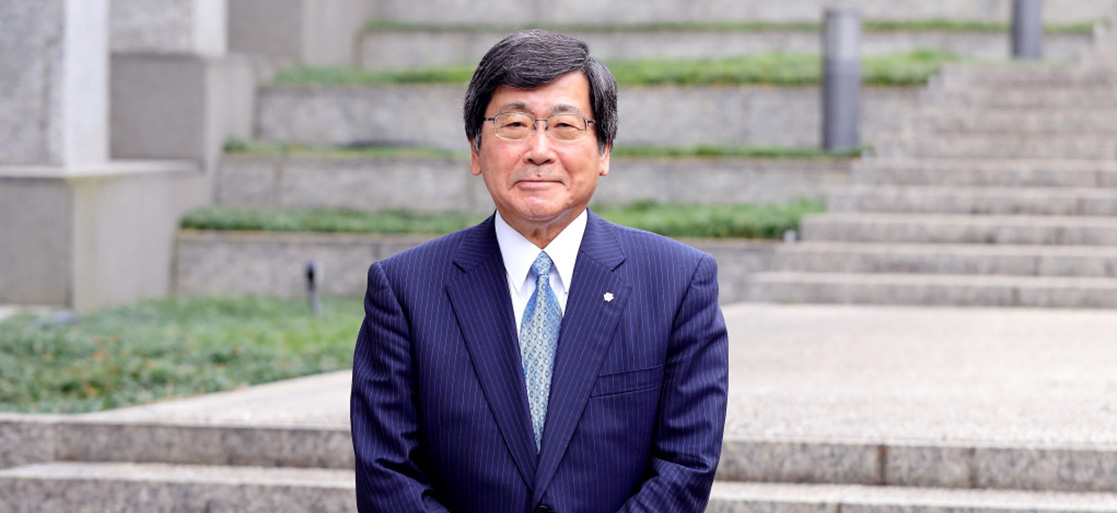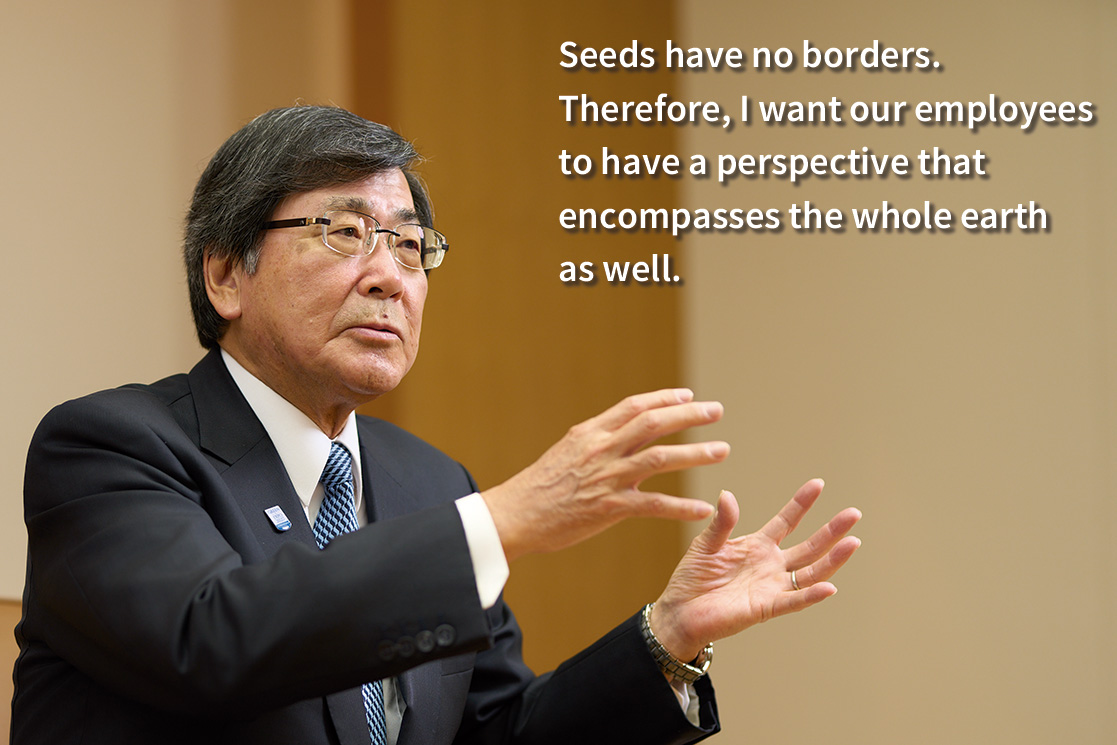Message From President

“We will continue to develop seeds with passion to deliver smiles and health to the world.”
Thoughts on the Publication of this Sustainability Report
The world is undergoing a lot of change now. In addition to climate change and economic uncertainty due to geopolitical risks, factors such as soaring raw material prices and food shortages, advancements in science and technology and a rise in environmental consciousness may also be called forms of change.
Companies have a responsibility to respond to these circumstances and contribute to realizing a sustainable society. So what can SAKATA Group do? I believe the answer lies in the company’s 111-year journey.
We are a research and development-based seed company that deals with living seeds and that conducts business in harmony with nature. Since our beginnings in 1913, we have continued to deliver seeds, the basis of agriculture and horticulture, in the face of various challenges. Nothing can begin without a seed, after all. I can confidently say that SAKATA Group’s business itself is a green business that supports the sustainability of society.
We currently have 39 companies (consolidated subsidiaries and affiliates) in 23 countries and supply seed to over 170 countries, with about 70% of our sales coming from overseas. To fulfill our responsibility as a company that does business all over the world and also to satisfy the demands of the times, we felt the need to set out the relationship between our activities and sustainability, and to explain it once more to society and to all of our stakeholders. That is why we decided to publish this Sustainability Report.
SAKATA Group’s Corporate Philosophy and Ideal Situation
Our company’s Corporate Philosophy consists of our Company Motto, Management Philosophy, and Corporate Group Slogan. Our Company Motto of “Quality, Reliability, Service” represented an unchanging spirit that we have carried on since our founding days. The “Quality” in the motto refers not only to the quality of our varieties but also the quality of all of our stages of R&D, production, distribution and sales. This is only natural, because the value of the varieties will change if even one of these stages is poorly carried out. For that reason, we also place great importance on the quality of our employees. Furthermore, the value of a seed cannot be known until it germinates and is harvested. Therefore “Reliability” is the absolute condition needed for our customers to trust us and purchase our seeds. “Service” stands for our intention to fulfill our responsibility to contribute to society as a company.
Our Management Philosophy states: “We contribute to the betterment of life and culture of the people around the world and aim to become the world’s leading seed company, with values created through our innovative flower & vegetable varieties and through our services.” The Philosophy consists of three points. Firstly, “Mutual Prosperity” where we aim for the prosperity of our clients, suppliers and the group itself. Secondly, “Mutual Interest” where employees, management and stockholders work together to flourish, and thirdly “Mutual Harmony” in which nature on earth, society surrounded by nature, and companies as an integral part of society aim to coexist sustainably. “Mutual Harmony” is the mindset permeating the company that we stated in writing in 2022.
We have set “PASSION in Seed” as our Corporate Group Slogan. It was newly formulated on the occasion of the 100th anniversary of our founding as a rewrite of the “PASSION” advocated by the late Kazuo Inamori (founder of Kyocera and KDDI), with his permission. This slogan encapsulates our determination to create seeds with passion to deliver smiles and health to the world.
Sakata Seed Corporation has always had a culture of carrying out innovative experiments, and indeed, that spirit is built into the very DNA of the company. When we changed our name from “T. Sakata & Company,” to “Sakata no Tane” in 1986, many were astonished by the uniquely direct name at the time. . We had already demonstrated our presence as game changers by releasing “Prince,” an improved oriental melon, in 1962, and releasing “Honey Bantam” in the 70s which completely changed the landscape by introducing sweetcorn to a market where chewy, mildly sweet corn was the norm. When it comes to development, since seeds are living things and we have nature to contend with, it is impossible to achieve 100% quality with a 100% germination rate. Nevertheless, we strive ceaselessly onwards with that 100% as our goal.
Our Competitive Advantage and the Human Capital Development Measures that Underpin it
The source of Sakata Seed Corporation’s competitive advantage is, simply put, employees with the drive to take on challenges.
Although many experimental cross-breeds are developed in the process of breeding varieties, strong determination is required to keep only the most superior ones, a small percentage of the whole, and discard all of the others. We must do this because the professional growers who use our company’s seeds demand nothing but very best. We must also continually work to improve new varieties even after they are released for sale. We gather information from near and far and constantly work on breeding new varieties while throwing away most of the experimental breeds we brought up with great care. This is only possible with an indomitable drive to take on challenges.
Another factor behind our competitive advantage, in my opinion, is our focus on being in the field. Whenever I visit a region, I always try to visit the production fields where the actual growing takes place. I use the Japanese words “GENBA” and “KODAWARI” with our overseas employees as well and tell them, “If you feel lost, study the GENBA and think,” and “Approach your duties with KODAWARI.” To evaluate varieties and check for issues requires the use of all five senses: to see, , smell, touch, hear, and taste. It would be even better if there were a sixth sense we could use—the ability to communicate with nature.
I endeavor to engage in dialogue with employees in order to encourage their drive to take on challenges and the attitude of working in the field. Whenever I go on a business trip, I try to speak directly to the local employees. I also repeatedly communicate the Company Motto, Management Philosophy and Corporate Group Slogan as well as the messages of “Be a challenger” and “Look at the GENBA” through video messages and company newsletters. Approximately 70% of the company’s almost 3,000 employees are overseas. Therefore I believe that spreading our philosophy is useful for fostering employees’ Group spirit as well.
Our Sustainability Management and Global Strategy

Steady supplies of seed are essential to the sustainable development of society, so we produce seed on a global basis, using the northern and southern hemispheres in different ways.
To tackle sustainability management more thoroughly, SAKATA Group established a Sustainability Committee in June 2023. Matters discussed by the committee will be referred to the Board of Directors for even deeper level discussions.
The traits desired from flower and vegetable varieties are closely linked to the food and horticultural cultures of a region. Therefore, in order to understand needs more clearly, we usually recruit the Presidents of overseas subsidiaries locally and entrust them with management. The Presidents of the companies meet in Japan a few times a year, and I also visit them regularly to dialogue with them in an effort to strengthen governance.
We have four materialities, namely “Preserving the global environment,” “Contributing to sustainable agriculture and horticulture,” “Enabling prosperous lives,” and “Strengthening our business foundations.” Under “Strengthening our business foundations,” we will aim to “focus on diversity and develop human capital,” and we are conducting training to develop human resources that can succeed on a global level. Personnel recommended by each group company gather at the group’s major offices, where they observe production fields and research stations, share information on market trends, and exchange opinions.
In 1988 I was posted to the Netherlands for six years, where I set up our European Representative Office. It was a challenging endeavor, but thanks to this experience, I learned about the logical business style of the Netherlands, which is one of the top exporters of agricultural and horticultural produce despite being smaller than Japan. It also trained my eye for looking at Japan objectively from outside. Seeds have no borders. Therefore, I want our employees to have a perspective that encompasses the whole earth as well.
I believe we will need an even more global strategy going forward. For one thing, demand for vegetables will most likely grow in emerging countries with large populations. I want to actively capture the market with the quality of our seeds and human capital.
Strictly speaking, Japan is not a country that is suited to the agricultural and horticultural business. But that is precisely what gives us the power to perform repeated R&D so that the seeds we create live up to the expectations of growers around the world. I want us to use that strength as leverage to spread SAKATA Group’s seeds throughout the world.
May 2024
Hiroshi Sakata
President
Sakata Seed Corporation